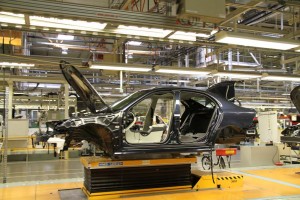Saab’s fate appears to be hanging by a thread despite finally receiving a cash infusion from a Chinese alliance looking to buy the struggling Swedish automaker.
Any decision on the fate of Saab has been delayed as the Swedish court that was scheduled to hear arguments over the company’s reorganization has temporarily put off a decision. No date has been set for a new hearing, Saab officials said. There had been pressure from Saab creditors – and its Swedish unions – to force the company into bankruptcy, which would likely have shut it down.
Meanwhile, Saab officials are growing slightly more confident about receiving final approval from the Chinese government for the deal that will allow an infusion of Chinese cash into the company. Last summer, dealer network Pang Da and automaker Zhejiang Youngman Lotus initially agreed to purchase a majority stake in Saab. They are now hoping to purchase the maker outright – but for barely a third of their original offer.
As it is, Saab is now surviving on a “bridge” loan advanced by its Chinese partners.
Michele Tinson, Saab USA’s spokesperson, said the company also is continuing to negotiate a new agreement with General Motors. GM was scheduled to resume building the 9-4X crossover to Saab’s specification at its assembly plant in Ramos Arizpe earlier this month.
The re-start of production of the 9-4X was delayed both by Saab’s continuing financial troubles and by GM’s concerns that the technology and design underlying the vehicle could be transferred to Saab’s new Chinese owners were the deal consummated. Saab is now trying to work out a deal that would satisfy GM.
Meanwhile, Saab’s only other source of vehicles, the assembly plant in Trollhattan, Sweden, has been closed since late last March due to a boycott by unpaid suppliers. Saab’s inventory of unsold vehicles has dropped accordingly. Saab is essentially out of vehicles in Europe and the inventory at U.S. dealers is dropping steadily.
Nonetheless, Saab officials are still hopeful they can keep the brand alive despite a lengthening string of setbacks that has exposed the woefully thin capitalization of the company, which was purchased from GM by Dutch-based Swedish Cars in early 2010.

